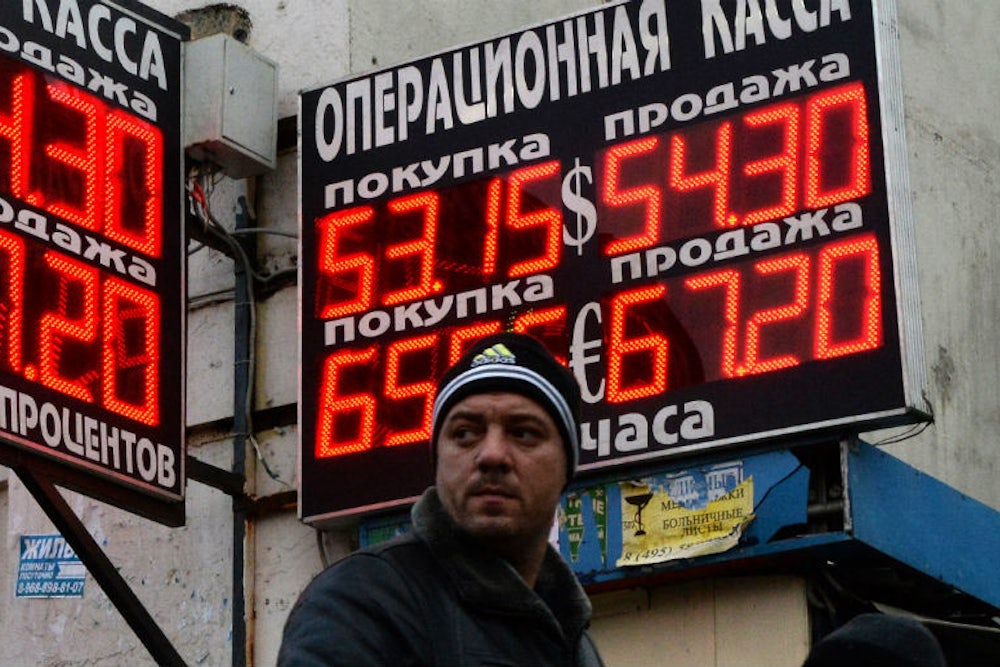The Russian ruble collapsed overnight, tumbling almost 20 percent on Tuesday to a record low of 80.10 rubles to the dollar. In a last-ditch effort to stabilize the currency, the Central Bank raised interest rates to 17 percent in the middle of the night, staving off the collapse for all of two hours, Reuters' Pierre Briancon reports.
#Russia ruble now beats #Ukraine hryvnia as world's worst performing currency in 2014. There's a certain irony in that.
— Steven Pifer (@steven_pifer) December 16, 2014Rosneft, Russia’s state-owned oil company run by President Vladimir Putin’s longtime friend and former chief of staff Igor Sechin, appears to be behind the currency’s abrupt tumble. Facing $60 billion in debt while bruised by Western sanctions, and having been denied a massive government bailout, the company scrambled to find a way to make debt payments due this month, according to The New York Times. Rosneft issued 625 billion rubles in bonds and sold them to Russian banks, which then deposited them with the Central Bank. “The central bank started the printing press to help the Sechin-Putin business, and gave Rosneft 625 billion newly printed rubles. The money immediately appeared on the currency market, and the rate collapsed,” the liberal Russian politician Boris Y. Nemtsov told the Times. End result: Rosneft wins, Russians lose.
What happened to #ruble: Central Bank printed 625bn RUB for Rosneft, the company started converting them into USD ($9bn), hence devaluation
— Yury Barmin (@yurybarmin) December 16, 2014In Moscow, people are rushing to use what’s left of their savings to buy cars, computers, and other expensive appliances—anything that might retain more value than the ruble. The government may soon be forced to introduce capital controls, Vedomosti reports, all thanks to the Central Bank’s efforts to save Sechin, who quickly denied any involvement in the ruble’s collapse.
All this underscores the extent to which Russia, under Putin’s rule, has become a kleptocratic state, run by a handful of oligarchs who use the law as a tool to extract capital gain. As Anne Applebaum writes in her review of Karen Dawisha’s new book, Putin’s Kleptocracy: Who Own’s Russia?, one of the sole objectives of Putin’s term in power has been to consolidate money in the hands of his closest advisors and friends. “Putin never abandoned the mafia methods Dawisha has so painstakingly described. Instead, he reshaped Russia’s political system in order to ensure that they could continue,” Applebaum writes. “Though Dawisha argues that Putin always intended to recreate an authoritarian, expansionist Russia, one could also argue that an authoritarian, expansionist Russia was the inevitable result of Putin’s need to protect himself, his cronies, and their money.”
New dawn? A 4OO foot-long ad for Rosneft seems to have replaced a giant shimmering Russian flag banner on New Arbat pic.twitter.com/jonmayW2e8
— Jason Corcoran (@jason_corcoran) December 16, 2014And speaking of expansionism, the ruble’s collapse seems to have triggered an abrupt revision of the Kremlin’s policy in Ukraine. Earlier this month, several senior Kremlin officials responsible for directing Russian policy in Ukraine resigned. On Tuesday, amid the ruble’s fall, Russian Foreign Minister Sergei Lavrov said “Moscow was not suggesting federalization or autonomy for the self-proclaimed republics of Donetsk and Luhansk, because the issue ‘is for Ukrainians to decide,’” Sputnik, Russia’s new state-owned media outlet, reported.
✔️31 Mar, 2014 $1 = 35RUB Ukraine needs federalization - Lavrov ✔️16 Dec, 2014 $1 = 80RUB Up to Ukraine to decide on federalization - Lavrov
— Maxim Eristavi (@MaximEristavi) December 16, 2014That brings the Kremlin a long way away from its messaging this spring, when Lavrov and others were adamantly calling for federalization in Ukraine's east. Now that the situation in the rebel's self-proclaimed republics is a full-blown frozen conflict, the Kremlin may no longer feel the need to keep funding the separatist rebellion—which is fortunate, because it can't afford to.
